Mary Kingswood's Blog, page 7
October 6, 2024
Review: An Unacceptable Offer by Mary Balogh (1988)
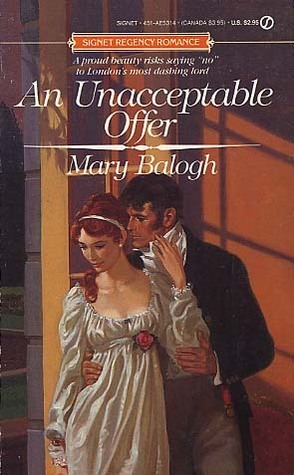 These early Baloghs are a bit of a mixed bag, but even at their worst, they show flashes of the author’s brilliance, and at their best, they’re superb. After a so-so last Balogh (The First Snowdrop), this one was definitely in the superb category, although as with all older books, the reviews are fairly mixed.
These early Baloghs are a bit of a mixed bag, but even at their worst, they show flashes of the author’s brilliance, and at their best, they’re superb. After a so-so last Balogh (The First Snowdrop), this one was definitely in the superb category, although as with all older books, the reviews are fairly mixed.
Here’s the premise: Jane Matthews is still unmarried at the age of twenty-three, but she’s having another season with her younger friend, Honor Jamieson. Jane is the quiet, rather plain, sensible one, while Honor is the beautiful bubblehead, revelling in her power over men, and flirting outrageously with any male who catches her eye. And the first man to do so is Michael, Viscount Fairfax, wildly handsome and now a widower with two small daughters, and in the market for a second wife. Honor determines she’ll have him, and his friend, Joseph Sedgeworth, a much plainer man, will do for Jane.
But then a strange thing happens, for Michael decides that Jane would do very well for his second, more practical, marriage and makes her a wildly unromantic proposal, which she rejects with extreme prejudice, giving him a piece of her mind for treating her like a commodity, not a person of worth in her own right. And the twist here is that she’s been in love with him ever since she first saw him five years earlier. And as if that weren’t enough, Jane finds herself falling into a comfortable friendship with the friend, Joseph, and when he proposes, she accepts him. Silly girl.
The Michael/Jane situation reminds me a bit of Georgette Heyer’s Sprig Muslin, where the heroine turns down the hero’s pragmatic offer because she’s been in love with him for years. Which never made the least bit of sense to me. If you love the guy, then for heaven’s sake marry him and wait for him to appreciate your true worth (as he inevitably will, if he’s a halfway decent sort of bloke). But Jane wants her true worth to be appreciated right now, thank you very much, and when Joseph does so, she settles for him instead of the man she loves. Who then promptly realises what he’s lost, and falls in love with her. Of course he does.
So the rest of the book is the familiar, not to say well-worn, engaged-to-the-wrong-person plot. The author’s method of extricating her characters from this tangle is ingenious, requiring the bubblehead to be sensible for once, although as it gets her what she wants, too, and she’s a very determined lady, it can also be viewed as a selfish move.
This book wasn’t subtle at all. When the scene shifts to the hero’s country home where the cute kids are waiting, inevitably they take to Jane at once and she to them, whereas the bubblehead hates kids with a passion and avoids them like the plague. Since the hero is besotted with them, any possibility of a match between them is out of the window. Meanwhile, hero and heroine are playing happy families, and bubblehead is amusing herself with the friend (who is engaged to the heroine, mark you, but bubblehead wouldn’t let a trivial detail like that stand in her way).
Since this is Mary Balogh, there has to be the obligatory sex scene, although it’s more of a quick fumble and a hasty adjusting of dress. It’s also completely unnecessary and (in my view) out of character for the people involved, but the author seems to feel the need for something graphic. It’s a pity, because otherwise this would please the traditionalists nicely. There are some minor anachronisms (dance cards and a modern style of waltz, but these are almost ubiquitous, sadly). Otherwise, this is an excellent examination of how marriage worked in Regency times, and how you choose a partner for life in the mad social whirl of the season, and the sort of mistakes that arise because of that. I very much enjoyed it. Five stars.
August 4, 2024
Review: Lord Clayborne’s Fancy by Laura Matthews (1980)
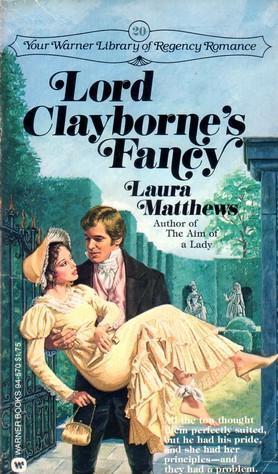 This is an odd sort of book. The reviews are mixed, to put it mildly, and I honestly thought I was going to hate it, and especially the nasty, suspicious, cheating husband, but I found it unexpectedly compelling. Strange.
This is an odd sort of book. The reviews are mixed, to put it mildly, and I honestly thought I was going to hate it, and especially the nasty, suspicious, cheating husband, but I found it unexpectedly compelling. Strange.
Note: There’s not much of a graphic nature in the book, but the whole premise and the difficulties between hero and heroine centre on sexual matters, so if you prefer a more traditional read, avoid this one.
Here’s the premise: Jason, Lord Clayborne, and his new wife Rebecca hit a crisis on their wedding night. He discovers after consummation that she hasn’t bled, and everyone knows that virgins always bleed the first time, don’t they? Ergo, she’s not a virgin. He might just possibly be prepared to overlook this heinous crime if she would just confess to it and apologise, but she doesn’t. In fact, she’s initially mystified by his pointing to the sheets (“What do you see?” “Nothing…”), but this doesn’t clue him in. He explains, she’s horrified, can’t account for the lack of blood but assures him she’s innocent of any such behaviour. He is so outraged by this wilful refusal to admit to her crime that he abandons her to shoot all over the country, including visits to London to take up with his former mistress (as we learn later). Meanwhile Rebecca uncomplainingly busies herself with running the house and waiting patiently for her husband to come to his senses.
Now, at this point, Jason is a pretty unlikeable hero, right? Refusing to believe his wife, arrogantly assuming he knows everything there is to know about the female body and then huffily consoling himself with another woman – it’s not a great look. And a lot of the negative reviews focus on that, which is understandable. But I have some sympathy with his position. Even today, there are plenty of misunderstandings between men and women, and even when a man may know something of the workings of women in general, he may not know just how the particular one he’s intimate with works. And in the Regency, when there was no internet and not much public discussion of the facts of anatomy, it would have been much easier for a man to be ignorant of the wide variety of womanhood.
So I can totally accept that he may not have known that some women don’t bleed the first time, and if he genuinely believed that she’d deceived him, his anger and hurt are all too understandable. A certain amount of avoidance of his wife would be expected in anyone of less than saintly character, and although the mistress is generally a no-no in a hero, I can see how he might have been so thrown off his axis that a determined woman could successfully seduce him. It’s bad, but it’s forgivable, I’d say, although I see why others may think differently.
The best part of a year goes by, and they’re still estranged, but a multitude of new characters turn up, so there’s a trip to London and then back to the country, during which time Jason and Rebecca are thrown together more than they have been, and he definitely starts to soften. It’s clear that he’s being gradually drawn back to her, just as when he was courting her. It’s obvious to the reader that he’s in love with her and perhaps he always has been, but he’s not quite ready to be open with her. Probably a mistake, but it’s very much in keeping with his character.
But in London Rebecca discovers that he saw his mistress again after he was married, and that is the final straw. She takes off with yet another new character to live apart from Jason, and she won’t even tell him where she’s going. And because he loves her and can’t bear her to be unhappy, he lets her go and even ups her allowance so she can afford to keep her horse.
This is the point at which any half-sensible hero would have come clean about his feelings. Something along the lines of ‘I love you and surely we can work this out without you leaving? Let’s talk about what might work.’ But of course talking is too simple, so we have to suffer through the whole separation thing before the author conjures up a tediously silly and overwrought subplot to bring the hero charging to the rescue.
By this time, he’s finally discovered that – oh noes! He was wrong about the whole bleeding thing so maybe his wife is innocent of wrongdoing after all. He’ll have to grovel and (at last!) tell her he loves her. But she’s constantly rushing round after other people and it’s hard to get a moment alone with her, and when he does, he decides the time isn’t right for grovelling, so we have to suffer through yet another tediously silly and overwrought subplot before he finally gets to grovel. It’s probably not a sufficiently grovelly sort of grovel, considering the hell he put her through, but it does the trick, since (fortuitously) she’s in love with him too. And that’s another thing some reviews take issue with, but since he’s actually very nice to his wife, apart from the whole abandonment and mistress thing, I can see where she’s coming from.
So for me, the main plot worked pretty well and I think the author did a good job of making both hero and heroine (mostly) likeable and understandable. My only real complaint is the plethora of plot-device extra characters who were wheeled on in the second half, and those tediously silly and overwrought subplots. There was also far too much space given to the minor characters, especially the garrulous governess and piously lazy clergyman (not amusing enough) and the annoyingly precocious child (not cute enough). All in all, about a third of the book and half the characters could have been dispensed with, without great loss. There are a few Americanisms, but nothing to frighten the horses. Too much talk of sexual matters for traditionalists, but I enjoyed it. Four stars.
Review: Lady Hathaway’s House Party by Joan Smith (1980)
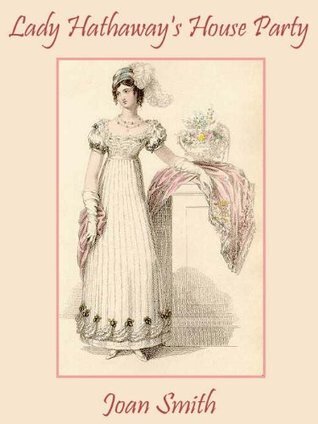 A broken marriage is a really difficult setup for an author to tackle, but I felt it worked really well, and the focus was very much on the principal couple, as it should be, rather than the minor characters or the subplots.
A broken marriage is a really difficult setup for an author to tackle, but I felt it worked really well, and the focus was very much on the principal couple, as it should be, rather than the minor characters or the subplots.
Here’s the premise: society sophisticate Oliver, the Duke of Avondale, had astonished the ton by marrying country mouse Miss Belle Anderson, a girl of no particular beauty, connections or fortune. Despite their very different backgrounds, he had clearly been besotted with her, for no obvious reason, yet as soon as they had married, he had stopped trailing round in her wake and gone back to his old habits, and within a month she had run back to the seclusion of her father’s house. They agreed to a formal separation, and there was talk of divorce. And then Lady Hathaway inadvertently invited them both to her house party…
I confess, I found it implausible that Belle would agree to go to a house party at all, since she’s barely left her father’s estate since leaving her husband. But there’d be no story without that, so let it pass. Oliver is not quite so reclusive and Lady Hathaway is his cousin, so that part is more plausible. And despite Lady Hathaway’s best intentions, the two meet accidentally and quite unaware that the other will be there, and while Belle is enjoying a moment with her cicisbeo. However, the two manage not to flounce (because, again, there’d be no story if they did), and the stage is set for an extremely awkward house party. He thinks he’ll just have a nice chat with his wife, perhaps recreate a pleasant moment from the early days of their marriage, and she’ll come back to him. But she’s edgy and snippy, and things go off the rails pretty fast.
We learn quite early on (because the author tells us) why they fell out. After a fairly intense courtship, when he followed her about like a puppy, once married, he assumed she would immediately adapt to the rather vapid and dissolute society life that he was used to, spending time with his gossipy friends and pursuing her own interests, mostly without him. She was hurt by the disappearance of the charming pre-marriage man who wanted to spend time with her. She disliked his friends and fell in with a crowd of lower gentry types, who went off in big groups to look at museums and watch balloon ascensions, things she would have liked to do with her husband. He bought her expensive, showy presents that she disliked. He was insulted that she rejected these attempts to please her.
And all of that (and more, because there’s a reason why Belle left so abruptly) has to be resolved before they can get together again. Their altercations are marked by bitterness and downright rage, which I found unusually intense for a book of this era. Anyone expecting a lot of light-hearted banter will be sorely disappointed. The pair find it difficult to talk to each other in any way that doesn’t end (and sometimes start!) with hostility. And yet right from the start, it’s clear that Oliver, at least, is determined to win Belle back. One has to wonder why on earth he didn’t go to her father’s house, where she was hiding out for the best part of a year, but still, he didn’t, so this is his best opportunity to talk to her. But every time he tries, they end up fighting.
There are some lighter moments, fortunately. Belle’s cicisbeo, Arnold Henderson, who’s been quite happy to squire her about and enjoy a delicate flirtation, is horrified to meet her husband. He had planned ‘to walk and sit and ride and talk with her, to dance and flirt discreetly and entertain her, and it was not only extremely difficult but actually impossible to do so with Avondale glowering at him with murder in his eyes. Avondale was a big man, for one thing, a good three inches taller than himself and a couple of stones heavier, in all the right places. Shoulders like a dashed door, and of course he was a famous boxer, in an amateur capacity.’ Poor Arnold spends the entire house party avoiding Oliver like the plague, in the hope of not getting knocked down by him, and his efforts are highly entertaining. Then there is the gossiping Lady Dempster, who ignores all the rules of politeness in order to find out what is going on between Belle and Oliver.
Meanwhile, Oliver has turned his charm on Belle and taken her riding, which is the right thing to do. She’s halfway to being won over, until a certain lady arrives from London, and everything falls to pieces again. The whole book is like this… two steps forward and one (or two or three) steps back, as the two fight their own anger to get on terms again, as they both want. Sometimes it’s external events which throw them into a tizz, and sometimes it’s their own stupidity or just an infelicitous word or two. Always it’s Oliver pressing forward towards a reconciliation and Belle hesitating and pushing back. The dialogue between these two is perfectly judged. Joan Smith has always had a skilled hand with that, but here she is absolutely superb, and every encounter between the two combatants (word used advisedly) is compelling, with the comedy moments brilliantly interspersed.
It’s not exactly a spoiler to tell you that everything works out in the end, although I really hope that Oliver can control that temper of his, or everything will fall apart again. A fascinating look into what happens when two people from different worlds fall in love but fail to communicate sensibly. Five stars.
Review: The First Snowdrop by Mary Balogh (1986)
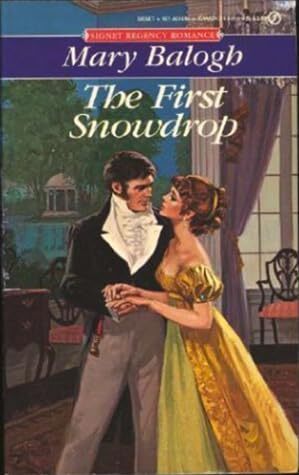 Well. A difficult book to review because there’s so much wrong with it, as a multitude of scathing reviews attest, and yet it had its moments, and the author managed to hit her trademark emotional highs. I can forgive a great deal when a book makes me tear up.
Well. A difficult book to review because there’s so much wrong with it, as a multitude of scathing reviews attest, and yet it had its moments, and the author managed to hit her trademark emotional highs. I can forgive a great deal when a book makes me tear up.
Here’s the premise: Alexander Stewart, Viscount Merrick, heir to a dukedom, is on his way to London to finalise his betrothal to Lady Lorraine, daughter of a marquess. He’s caught in a snowstorm and seeks shelter at the nearest habitation, a large house containing only one female servant, Anne Parish. He orders the servant about, and considers quite seriously whether to bed her, but only backs away when he realises she is innocent and that might result in a great deal of tedious squawking. He really is an arrogant, entitled jerk at this point.
The next morning, he discovers his error. She’s not a servant but the unassuming sister of the owner, who returns mid-morning with the vicar, finds Alex in residence and sets up an even more tedious squawking. His sister has been compromised, he says, and he expects Alex to marry her pronto, and so does the vicar. And Alex tamely does so, even putting some effort into being charming to Anne, so that she’s quite convinced that he’s fallen in love with her. Not so, for as soon as the wedding is over, he takes her to Redlands, a much-neglected minor property of his, and dumps her there. But not before telling her in the harshest terms that he thinks she’s trapped him into marriage. Oh, and also not before bedding her, and discovering the passionate woman within. Lovely guy.
Let’s just unpack some of that. First of all, there’s really no need for him to marry her at all. He’s the heir to a dukedom, after all, and she’s lower gentry, at best. Besides, he’s already committed to the lovely Lorraine, not officially betrothed but with a clear understanding. Further, nothing actually happened between Alex and Anne, and no one knows about it except the brother and the vicar, and are they really likely to tell the world? Hardly. So by far the most sensible answer is for Alex to simply apologise for mistaking her for a servant, but refuse to marry her. After all, he would have died if she hadn’t taken him in, and that would be slightly unreasonable, merely to preserve her reputation.
Secondly, what is Alex thinking of to propose with politeness and even charm, and then turn on Anne so viciously? Where are his gentlemanly manners? She’s his wife, for heaven’s sake, and even though she isn’t the wife he wanted or expected, what’s done is done, and he could at least be courteous to her. But no, he refuses to let her leave Redlands for any reason, taking up with a mistress in London and to all intents and purposes ignoring Anne altogether.
She has a bit more gumption, so after a weepy phase, she picks herself up, and gives herself, the house and the garden a makeover. I always disapprove of the ugly-duckling-to-swan routine, so beloved of romance books, as if a plain, dumpy girl can’t be loved for herself, but here we go again. She loses weight, and allows her maid to turn her into an elegantly fashionable lady. And lo and behold, she’s beautiful! Who’d a thunk it?
An aside here about the weight thing. The Regency, in fact the whole of history up until perhaps the 1920s, was an age of conspicuous consumption. If you had money, you flaunted it. Queen Elizabeth I wore jewels stitched onto her gowns. The Georgians wore gorgeous brocades and wigs too elaborate to do any actual work in. The Regency saw women in impractical pale muslins, and men in equally impractical white, starched cravats, to prove they had enough clothes to change frequently. The Victorians put their women in vast hooped skirts using yards and yards of material. And all of them saw nothing wrong with eating heartily. You’ve only got to look at the portraits of the era to see the nicely rounded arms and shoulders of the women. Only poor people were thin. But even in Balogh’s later series, she’s still putting out the idea that plump women are less than ideal.
Needless to say, Alex can’t avoid Anne altogether and eventually his ducal grandparents force them together by inviting them both to a house party, where Alex naturally fails to recognise his now beautiful, fashionable wife. Again, he blows hot and cold, ignoring her during the day and bedding her enthusiastically at night. But the duchess has a cunning scheme to force a reconciliation, by making all the young ones perform in a play and… No, let’s not talk about the play. It was all too tedious for words, with a cast of thousands of cousins, about whom the reader doesn’t give a fig. And of course, Alex and Anne inch towards an accommodation and even (surely not?) love.
Naturally, it’s not as simple as that, because Alex is *still* an arrogant, entitled so-and-so. Unbelievable. Here’s the thing, arrogant, entitled hero – if you want to make your wife happy, you have to start by finding out what that might be, not just by assuming you know what she wants. She soon sets him straight on that one, giving him both barrels and then some, and finally, at long last, a tiny drop of humility seeps into his arrogant, entitled head. And it gets kind of emotional, which is a thing that Mary Balogh does exceptionally well. Almost that final moment got my rating up to four stars. Almost.
But he’s just such a horrible hero, I can’t quite forgive him, so three stars it is.
July 18, 2024
Review: Petteril’s Folly by Mary Lancaster (2024)
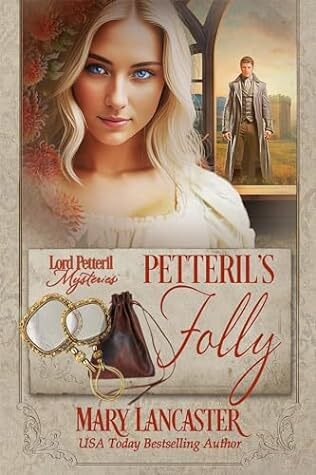 This series just gets better and better. At the end of the last book, Piers and April found themselves in an awkward situation which they resolved by getting married. Now, after an idyllic honeymoon, they return to England to face the music, and explain just why a viscount married an ex-thief from the slums of London. Not that anyone knows April’s full history, but they know she’s basically a servant. Now, dressed for her rank, and behaving like a lady, will she be accepted or will the sky fall in on their heads?
This series just gets better and better. At the end of the last book, Piers and April found themselves in an awkward situation which they resolved by getting married. Now, after an idyllic honeymoon, they return to England to face the music, and explain just why a viscount married an ex-thief from the slums of London. Not that anyone knows April’s full history, but they know she’s basically a servant. Now, dressed for her rank, and behaving like a lady, will she be accepted or will the sky fall in on their heads?
Meanwhile, Piers’ valet, Stewart, has been arrested for stealing a baronet’s purse at the local inn, and our intrepid sleuthing duo have to uncover the truth of what happened that night and rescue Stewart from the false accusation. There’s the usual array of suspects, and the question of who’s telling the truth. I have to say that the mysteries aren’t the main reason I read this series, but they’re always enjoyable to see unravelled. This one is particularly satisfying because when the truth is revealed, it’s a case of ‘oh, of course’ and not ‘oh well, I suppose that makes sense’. I felt that if I’d been bothered to think it through, I’d have worked it out.
But really, I’m here for Piers and April. They’re such an unlikely couple, both damaged and needy in different ways, and yet totally dependent on each other. I’ve said all along that April’s transformation from guttersnipe to servant to lady and now to viscountess is not believable in the slightest. Spread over several years, maybe, but that’s not the case here. And somehow, astonishingly, the servants who had known April as a servant fail to recognise her as the new viscountess. Is that remotely credible? I don’t think so. They might pretend not to remember her previous incarnation, but they would certainly recognise her. I’m reminded of the Downton Abbey housemaid who left to become a secretary, married her boss and returned on a visit as a respectable upper-class wife, and she was certainly recognised. There are certainly times when you can’t place someone when you see them in a different context but you generally know that you know them.
But it’s a small point. Given the big leap in the last book which saw the pair married, all their well-wishers must be glad the author didn’t keep us in suspense as to how things are going to go. I can’t see a smooth path from here on, though. Things are still going to be rocky with the family, and I suspect there’s some serious history to April that’s yet to be uncovered. We shall see. But in the meantime, another well-earned five stars for a highly enjoyable read, and on to the next book in this addictive series.
Review: The Meddler by Kate Archer (2022)
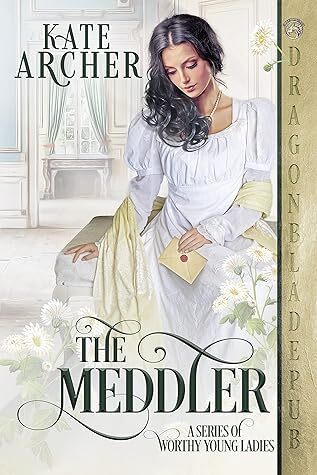 I romped through Archer’s first series scattering five star reviews like rose petals, and this series is already going the same way. The author has a wonderfully humorous style of writing not just the upper classes but also the servant class, which adds a whole new dimension to the book.
I romped through Archer’s first series scattering five star reviews like rose petals, and this series is already going the same way. The author has a wonderfully humorous style of writing not just the upper classes but also the servant class, which adds a whole new dimension to the book.Here’s the premise: six noble ladies who have not themselves had daughters decide to each sponsor a girl through the season, choosing someone who would not otherwise have the opportunity and hoping to triumphantly see each girl suitably married. The first girl chosen is Georgiana Wilcox, daughter of an impoverished baron, who is to be brought into society by Lady Mendleton. Like all the sponsoring ladies, Lady Mendelton has a mental image of how a daughter ought to be – sweet, gentle, demure and (naturally) highly accomplished at all the maidenly arts. Georgiana, she discovers, is not like that. Her unconventional upbringing has taught her to ride, but astride, not sidesaddle, she can’t sing, can’t play an instrument, doesn’t paint or draw or net purses. She’s also very direct, and no shrinking violet. Fortunately, she can dance, and she’s also smart, solving a murder puzzle before anyone else and winning a meeting with the Queen.
She’s been brought to London to find a husband, and there’s just one man who’s out of bounds, and that is Lady Mendleton’s own son, Jasper, Viscount Langley, who his mother has hopes of marrying off to Lady Annabelle Rumsford, a marquess’s daughter. Needless to say, Jasper turns out to be just the man to give Georgiana the wobbles, and it seems he might have the wobbles for her too…
Woven through this fairly straightforward romance is a somewhat implausible mystery involving Queen Charlotte, mad King George and the Stuart pretender to the throne. Jasper acts as an agent for the Queen, trying to find out who is passing information about the King’s madness to the newspapers. It has to be said at once that Jasper must be the world’s worst investigator, for he consistently jumps to the wrong conclusions, and never sees the patently obvious solution right under his own nose. For instance, having worked out that the information is spread from his own household and could be emanating from any of the residents, he then decides it must be Georgiana and sets a trap for her by leaving false information where it could easily be spotted, not just by her, but by anyone in the household. When that information is published, he decides he’s got proof that it’s her. Basically, he’s an idiot.
Georgiana’s progress through London society is very funny, especially the attempts to mount a horse fitted with a sidesaddle for the first time, which had me laughing till I cried. I’ve never before encountered a version of the Regency where a lady would drive to Hyde Park in a carriage with a groom bringing her horse, and then mount up in the park. It might have been done that way, I suppose, and it certainly makes for a gloriously public faux pas, but I’d have thought most riders would mount up in the mews behind the house, or the horse might be brought to the door, and then they’d ride to the park.
Can I just mention here how much I dislike Regency heroines who ride astride? I know it makes her unconventional and feisty and independent and all that jazz, but it also makes her outrageously scandalous. Whether you do it sensibly, in trousers, or impractically in a skirt that flies up and reveals most of your legs, it would be a shocking thing to do, as bad as the legendary bad thing of tying your garter in public. Even in a voluminous riding habit, designed to keep a lady’s legs decorously hidden, riding astride would reveal more than any respectable maiden should do. If you’ve seen season 2 of Bridgerton, you’ll know exactly what I mean. And as for jumping onto a horse astride in a ballgown – no. Just, no. And while I’m on the subject, one of Georgiana’s outings to the park (in a carriage, with the horse brought by a groom) has the groom riding her horse. So either the groom was riding sidesaddle or Georgiana was planning to ride astride. Either way, it’s a no no.
The romance isn’t the most sizzling in the world. The couple spend very little time together, and when they do we don’t really get much insight into what attracts them to each other apart from he’s handsome and she’s beautiful. But there are some nice moments of introspection. She’s sensibly trying not to be drawn to him, knowing she has an obligation to make a good match and he’s out of bounds. And he rather sweetly agonises over the right time to make his move. If he goes in too late, someone else might snaffle her, but he has to be sure. It’s tricky, and (frankly) he’s not the sharpest knife in the block, so he dithers a bit, but it was a nice insight. I’ve always known that it was difficult for women – does he like me or not, is he going to offer or not, and if someone who’s just meh offers, do I take him or hold out for the one I really want? But it wasn’t easy for men either!
The climax is pretty over the top, all things considered, with thicko Jasper getting himself in hot water, and Georgiana and half the servants having to rescue him. But it’s all quite neatly done, it brings all that romantic dithering to a resounding end, and it’s very funny, to boot, so no complaints from me. The writing is very readable, although with some Americanisms that triggered my (admittedly over-sensitive) pedantometer. Buckingham Palace was twice called simply Buckingham, which was pretty odd, and wasn’t it still Buckingham House at this point? We don’t have faucets in England, only taps. Dancing cards were a Victorian idea. And the author seems to have an aversion to adverbs, so there’s ‘arriving unexpected’ instead of ‘arriving unexpectedly’.
None of that mattered though, because the whole book was just so much fun that I’m going for five stars again.
July 17, 2024
Review: A Capital Arrangement by Christina Dudley (2024)
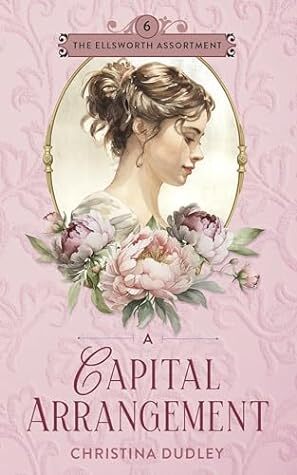 Oh, the joy of a new Christina Dudley book! Sadly this is the last of the Ellsworth Assortment series, following the romantic adventures of a father who married four times and had the eponymous assortment of children. This features the youngest daughter, Beatrice, the sensitive one of the family, and is a charming wrap-up of the series.
Oh, the joy of a new Christina Dudley book! Sadly this is the last of the Ellsworth Assortment series, following the romantic adventures of a father who married four times and had the eponymous assortment of children. This features the youngest daughter, Beatrice, the sensitive one of the family, and is a charming wrap-up of the series.
Here’s the premise: Beatrice Ellsworth looks to be set for contented spinsterhood. She’s happy not venturing too far from home, helping her older siblings with their growing families and not finding a man to suit her from the limited selection around Winchester. Her family conspire to arrange a trip to the seaside for her, to unfashionable Bognor, in the hope that a change of scene will inspire a change of heart. Their plans succeed beyond their wildest dreams, for on a sea bathing expedition, an accident with the bathing machine leaves Beatrice trapped underwater. Happily, another bather comes to her rescue, and even more happily he turns out to be a handsome and personable young man. The Ellsworths immediately draw him into their sphere and stand back to allow love to develop.
Which it does, but there’s a teeny, tiny problem – John Clayton, the aforementioned personable young man is already engaged. He’s a canal engineer, and when his mentor in that career died two years before, he left John everything – his business, and his daughter and the fortune she’s inherited. All John has to do is to marry her. At the time, it seemed like a great idea. Now, meeting Beatrice and being instantly smitten, he sees the flaws in the arrangement. But John is an honourable man, so he tells the Ellsworths that he’s engaged, which is just as well, for his betrothed, Priscilla, arrives in Bognor on a surprise visit.
Beatrice accepts that John is not for her, but she doesn’t have the temperament to shake off her disappointment easily. To distract her from her woes, she’s shipped off to London with a family with a daughter of her own age, who’s been torn from the highly unsuitable arms of a groom, and is also to be distracted by London entertainments (and hopefully find a more suitable husband). Now, Marjorie is a real piece of work, and I’d bet that most of us know someone just like her. She’s either Beatrice’s very, very best friend or her mortal enemy, with no point in between. Everything that goes against Marjorie’s own wishes is Beatrice’s fault, and she’s completely and utterly selfish and irrational. And also very funny, it has to be said. And while she’s busily falling for another swain almost as unsuitable as the groom, Beatrice is struggling to overcome her feelings for John Clayton, who pops up everywhere (even at Almack’s, which I felt was a bit of a stretch, but never mind). He’s trying to drum up investors for his canal, while his betrothed is beginning to realise that he’s just as canal-obsessed as her father ever was.
The ending brought no surprises at all, but that’s not a criticism. It means that no unRegency-like rabbits were pulled out of hats to get John out of his betrothal. I did want to box his ears, mind you, at that long-drawn-out proposal. There comes a point when explanations can wait and the couple just need to fall into each other’s arms and enjoy a long, toe-tingling kiss. There was one surprise, though – Mr Rotherwood, who wandered onstage from the previous series, a delightful appearance (once I’d worked out who he was and why his story sounded so familiar!).
This is a quieter book than some of the earlier ones of the series, but that’s entirely in keeping with Beatrice’s quieter nature, so that’s not a criticism either. There’s a smattering of Americanisms but it’s so beautifully written in other ways and I was enjoying the book so much that I didn’t care. In some ways, the previous book, with its stronger emphasis on the glorious Ellsworth family, would have made a more resounding series finale (wouldn’t we all love to be part of a big, rumbustious, affectionate family like the Ellsworths?). Still, this was a wonderful read. A very worthy five stars and I commend the whole series to anyone looking for a literate, intelligent and witty read with a true grasp of the Regency.
Review: Strange Capers by Joan Smith (1986)
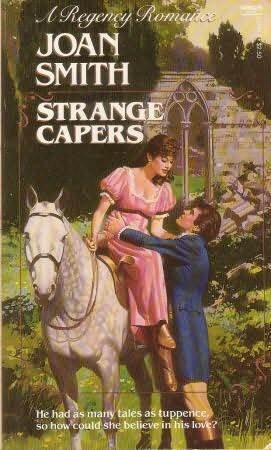 Never was a book more aptly titled – strange capers, indeed. I had no idea what was going on, or who was on which side, or what was true and what was just an outright lie for most of the book. And the romance was a bit strange, too. But despite all that, it was wildly funny and I enjoyed it hugely.
Never was a book more aptly titled – strange capers, indeed. I had no idea what was going on, or who was on which side, or what was true and what was just an outright lie for most of the book. And the romance was a bit strange, too. But despite all that, it was wildly funny and I enjoyed it hugely.
Here’s the premise: Constance Pethel lives at a rundown old manor house, Thornbury, on the south coast with a widow, Lady Savage, who for years has been wheedling funds out of the house’s owner, Lord Aiglon, for refubishment, which she then never carries out. Constance has learnt to go along with Rachel’s manipulations for a quiet life, although she doesn’t really approve. The days and weeks and years drift by, and the only excitement is the prospect of Bonaparte invading. To that end, a militia has been got up locally, but a shipment of rifles for them has mysteriously disappeared, probably into French hands. Into this placid existence comes Lord Aiglon himself, and the two ladies soon have more to worry about than Aiglon discovering that the funds for refurbishment have been pocketed by Rachel.
Aiglon is a curious sort of hero, but one that’s all too common in books of this age. He’s top-to-toe aristocratic entitlement, needless to say, but when he makes a play for Constance, is he just flirting or does he have something more serious in mind, and if so what? Constance can’t make him out (and neither can the reader initially) since he tells her many things that sound reprehensible (that he’s gambled away his fortune, he’s hiding because he’s killed a man in a duel, he routinely gets blind drunk, and a whole lot more besides). But every time she begins to suspect that he’s not really as bad as he makes himself out to be, she uncovers some other element of his behaviour that makes him seem even more of a villain. Might he even be involved in traitorous activities like selling arms to the French? And all the time, he’s relentlessly pursuing Constance, and even sweeping her into his arms for a passionate kiss without so much as a by-your-leave. That’s the aristocratic entitlement at work.
Constance, meanwhile, who has more hair than wit, is swept this way and that by the constantly veering lord (he’s an earl, we find out eventually), quite unable to make up her mind whether he’s trustworthy or not, on any level. She’s also played for a fool by Rachel, who doesn’t hesitate to send her to keep watch on Aiglon or listen at keyholes, which she does without a second thought. Like I said, more hair than wit. Frankly, it’s hard to see what Aiglon sees in her.
The finale is completely over the top, but at least it brings the romance to a resounding conclusion, with a little bit more build-up than is common in this vintage. Some Regencies from this era leave the romance to the very last page, the hero proposes and that’s it, but we do get a bit more than that here, with some nice romantic moments to enjoy. That was, frankly, the best part of the melodramatic ending which was all too silly for words.
But the complexities of the slowly unravelling plot, and the constant blatant lies and machinations of all the principal players (apart from Constance, of course, who has no clue what’s going on) are very funny, and I enjoyed it all enormously. It’s awash with Americanisms (we didn’t and still don’t have real estate agencies here, or ‘everything’ stores), but that’s par for the course with this author. If you want a change from modern angsty Regencies, Joan Smith is well worth a try, but be warned that her books are very variable. I rate most as four or five stars, but I’ve had the odd one or two I just couldn’t finish. Happily, this one is definitely a five star for me.
Review: True Companions by Jenny Hambly (2024)
 Another gentle read from Jenny Hambly, with a delightful mix of characters, not one but two sweet romances and another of her wonderfully atmospheric houses. Oh yes, and a snappy dog and a foul-mouthed parrot. I wonder why it is that Regency parrots are always so rude? There must be one or two that could be trained to recite Shakespeare’s sonnets, or quotes from the Bible. But I digress.
Another gentle read from Jenny Hambly, with a delightful mix of characters, not one but two sweet romances and another of her wonderfully atmospheric houses. Oh yes, and a snappy dog and a foul-mouthed parrot. I wonder why it is that Regency parrots are always so rude? There must be one or two that could be trained to recite Shakespeare’s sonnets, or quotes from the Bible. But I digress.
Here’s the premise: Lucy Talbot has been a resident of Ashwick Hall, a refuge for women fleeing from trouble, for two years, hiding away from her family and society while she recovers from a breach with her twin sister. Now her godmother has returned from abroad and wishes to reclaim Lucy and reintroduce her to society – and her own family, not just her estranged sister, but her brother, too, who was raised largely apart from his sisters. Mr Frederick Ashton (Freddie) is regarded as a buffoon because of his cherubic appearance and seeming lack of intelligence, as well as his habit of falling asleep anywhere – even at a ball! But his sleep problems result from the nightmares he’s suffered from for years. To try to cure them, he determines to return to his childhood home for the first time since his parents were murdered there.
So there we have the two main characters and their backstories, and as is usual with a Hambly book, there’s a lot of backstory laid out upfront at the start of the book, which does tend to slow things down a bit. There’s also a problem in that the two main characters are not connected and there’s not the usual meet-at-a-ball setup to get things rolling. So they meet accidentally in the park on account of Jacko the monkey, which is quite cute (ha! A meet-cute, right?) but it feels just a shade coincidental.
This early part of the book feels quite slow. There is all that backstory to be unfurled in the early chapters. Then there’s the slow and rather forced development of the friendship between Lucy and Freddie in London. Lucy’s brother makes a brief appearance and then vanishes. I wasn’t sure what purpose he served in the story, but perhaps he is being prepared for a larger role in a later book. Come to that, I didn’t quite see the point of Lord and Lady Kirkby, either. I wondered whether I should have recognised them from an earlier book, but even if so, I didn’t think they added materially to the story. Nor did the little side story of the maid add much, except to show Lucy’s compassion, although that was already clear enough, I should have thought.
So this early part of the book was quite lumpy and disjointed, not uninteresting but without the usual smooth flow of Hambly’s writing. But then we arrive at Ashton Manor, and the author’s great strength comes to the fore – her wonderful way of describing places. The house (based on a real house, Haddon Hall, apparently) is a fascinating medieval building with all sorts of quirky passages and oddly placed stairs. I’d have loved to have a proper floor plan to follow along as the characters moved about the house, but perhaps that would have spoilt the surprises. One of Hambly’s earlier books, Carteret, also features a house that’s so brilliantly described it’s almost like another character, as it is here.
Meanwhile Lucy and Freddie are inching towards something more than friendship. I liked both characters. Lucy is beautifully drawn, a complex character who appears timid on the surface but has a steel backbone when required, and Freddie is just a sweetheart. Who could not love him? He’s another of Hambly’s unusual heroes, reminding me a little of the delightful Derry, star of Derriford, who was a perfect gentleman of surprising talents who became utterly tongue-tied in the presence of ladies.
Abby I liked a lot less. I found her rather a nasty, vindictive creature at times, and although some of her mischief arose from the best of motives, it didn’t always look that way. If I’d been Lucy, I’m not sure I’d have forgiven her for some of her transgressions. There was a villain, of course, who was flagged up almost from the start, but his villainy was thwarted, naturally. This was really the only action in the whole book.
The romance… well, the outcome was inevitable, but I wasn’t at all sure of Freddie’s dramatic proposal. It seemed to come too quickly and to be too overwrought for a man of such gentlemanly manners, but that’s just me. I far prefer a gentler finale, personally. And a couple of side characters reach their own finale in a somewhat awkwardly written manner. While I’m grumbling, can I just mention how confusing it is to have two characters called Lucinda and Lucy (who was also Drusilla)? And then there were all the ladies – Lady Westcliffe, Lady Wirksworth, Lady Frampton, Lady Kirkby. Each time I came across one of those, there was a momentary adjustment to make: now, which one is this? And one final grumble. I was very surprised to see some Americanisms creeping into a book by a British author – drapes instead of curtains, for instance, and ‘quite the adventure’ where I would say ‘quite AN adventure’. Trivial stuff, but it tripped me up.
Does this sound very critical? Perhaps it’s just the result of coming to this straight after a whole series of very different Regencies, and this suffered by contrast. It is, as always with this author, beautifully written, some of my grumbles (like putting a lot of backstory in the early chapters) are just the way this author writes, and as usual she nails the characters perfectly. This is a perfect read for anyone looking for an authentic Regency in a gentle, low-action story. Freddie is an absolute darling, and I loved the evocative descriptions of Ashton Manor, so I’m going to settle for four stars.
June 16, 2024
Review: The Earl’s Iron Warrant by Kate Archer (2021)
 A terrific end to an excellent series. Yes, there was a certain sameiness to the plots but there was so much originality to the side issues, and it was so damned funny, I can forgive everything.
A terrific end to an excellent series. Yes, there was a certain sameiness to the plots but there was so much originality to the side issues, and it was so damned funny, I can forgive everything.Here’s the premise: of the six dukes who set up the original pact (the premise of the series) for their sons to be forced to marry and produce heirs, five have complied. Only Lord Dalton still defies his father, swearing he will never marry, no matter what. Miss Daisy Danworth, daughter of the positively horrid Lord Childress, has also sworn never to marry, and the death of her not at all lamented parent changes that not one whit. She’ll come of age in a few months, and into her substantial inheritance from her mother, and then she’ll be free to live her life as she pleases, and a husband has no part in that. But her father’s heir is Lord Dalton’s father, and, in the devious way of fathers keen to marry off their sons, he sends Daisy to Ramsgate to see out her mourning period, with Lord Dalton to watch over her.
I wondered at once how it was that the heir to a viscountcy was a duke, a situation so implausible as to need some detailed explanation to account for it, but never mind. This whole series is awash with implausibilities so let it pass. As is the way with this series, the principals are already very aware of each other, despite the never marrying business. So the whole book becomes a slow slide into love, or rather, the awareness of an already existing love.
But really, the main point of the story is not the romance, because we already know exactly how that’s going to go. It’s all about the situation and the odd events it throws up and (as is now a hallmark of this author) the quirky doings of the servants. Bellamy the fairly incompetent butler, the cowardly footmen, Mrs Broadbent, the housekeeper, with her ‘what-fors’ are all priceless. Then there’s the mangy cat that Lord Dalton adopts in a real-world example of the ‘save the cat’ principle of stories (which is to establish an unlikely and possibly unlikable character as a hero by showing him saving a cat at an early stage). There are some brilliant moments which will stay with me for a long time (for instance, the two lords, otherwise bereft of weaponry, answering an unexpected knock on the door with pokers, being the only things that came to hand).
I confess I was a little disappointed at the resolution to Lord Burke’s story, which has been hinted at for the last couple of books but turned out to be something not very original. I thought there was going to be a lot more to it, but hey-ho, it made a heart-warming little sub-plot, I suppose. And I suppose Lord Dalton’s backstory, and his reasons for holding out against marriage for so long, is also not very original. The blurb says his reasons are ‘not what people imagine’, but they were exactly what I imagined, so that too was a slight disappointment.
But the main characters were lovely, even Lord Dalton who was something of a villain in earlier books. I liked Daisy, apart from the name. So cool and elegant a lady deserved a less bucolic name, I felt, especially as it seemed incongruous that her father, with his social ambitions, would countenance it. The mystery part of the plot was mildly interesting, even if not particularly believable (why ransack the library and then later return and go directly to the right place?). The incident in the sea was truly scary, to those of us with a fear of drowning.
There were a few oddities. I’ve already mentioned the heir to the viscountcy being a duke. There’s also a misunderstanding about Regency meals. The heroine is shocked to have all the various dishes on the table at once. In fact, that was the norm in those days, and even if she was more used to the newly fashionable idea of individual starter/fish/meat/dessert courses, she would have been very familiar with the old style. Also, the mention of drinking chocolate is anachronistic. All chocolate was drunk in the Regency. Solid chocolate just wasn’t a thing.
But these issues never bothered me overmuch. There’s a charm to these stories that trumps any nitpicky quibbles, and I’ve blazed through the whole series in a few days, enjoying every one hugely. Book 2 is perhaps my favourite by a slight margin, but they’re all wonderfully readable, and this one is by far the funniest. Highly entertaining. Yet again, this merits five stars.



